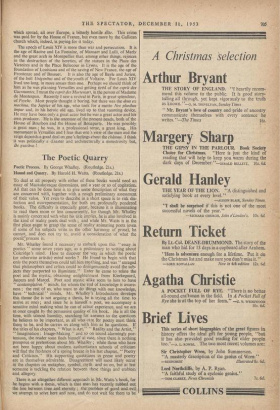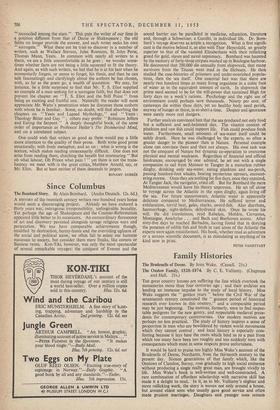The Poetic Quarry
To deal at all properly with either of these books would need an essay of Macaulayesque dimensions, and a year or so of cogitation. All that can be done here is to give some description of what they are concerned with, together with a rough preliminary assessment of their value. Yet even to describe in a short space is to risk dis- tortion and misrepresentation, for both are profoundly pondered books. The difficulty is especially great, because it is illuminating to read them more or less concurrently, for though Mr. Whalley is mainly concerned with what his title implies, he is also involved in the kind of reality poets deal with ; and while Mr. Watts is in the first place eager to grasp the sense of reality animating poets (even if some or his subjects write in the other harmony of prose), he cannot, and does not try to, avoid a consideration of what the poetKprocess is.
Mr. Whalley found it necessary to embark upon this " essay in poetics " some seven years ago, as a preliminary to writing about Coleridge's mind. How to discover the way in which the poetic (or otherwise artistic) mind works ? He found to begin with that only the poets themselves could tell him anything, and was " enraged that philosophers and critics could so disingenuously avoid the sub- jects they purported to illuminate." Later he came to relate the poet and the mystic, obtaining enlightenment from Kierkegaard, Jaspers and Marcel. Poet and mystic alike seem to him to have " contemplative " minds, for whom the end of knowledge is aware- ness ; the rest of us, who want to do things with our knowledge, have " technical " minds. Mr. Whalley's 'Introduction develops this theme (he is not arguing a thesis, he is trying all the time to arrive at one) ; and since he is himself a poet, we accompany a sensitive mind making what he can of actual experience, and we are at once caught by the persuasive quality of his book. He is all the time, with utmost humility, searching for answers to the questions he believes to be important, as all who care for poetry must think thein to be, and he carries us along with him as he questions. If the titles of his chapters, " What is Art," " Reality and the Artist," " Imagination : Image-Making " and so on sound alarmingly por- tentous, the reader soon finds himself at ease, since there is nothing pompous or pretentious about Mr. Whalley ; while those who have not been happy about modern authoritarian schools of criticism will find the freshness of a spring breeze in his last chapter, " Poetry and Criticism." His supporting quotations in prose and poetry are in themselves admirable. Disagreement will most likely occur in the chapters on metaphor, symbol, myth and so on, but at last someone is tackling the relation between these things and emblem and allegory.
There is an altogether different approach in Mr. Watts's book, for he begins with a thesis, which is that man has recently rubbed out the line between time and eternity ; the problem of good and evil. we attempt to solve here and now, and do not wait for them to be " reconciled among the stars." This puts the writer of our time in a position different from that of Dante or Shakespeare ; the old faiths no longer provide the answer, and each writer seeks his own "surrogate." What these are he tries to discover in a number of writers, such as Wallace Stevens, Jules Romains, St. John Perse, Thomas Mann, Yeats. In common with nearly all writers to a thesis, we are a little uncomfortable as he goes ; we wonder some- times whether facts are not being a little squeezed to fit the theory. And again, as with such writers, we feel that he is at his best when he momentarily forgets, or seems to forget, his thesis, and then he can talk fascinatingly and clarifyingly about the authors he has chosen, with, as far as the poets go, a wealth of quotation. We may, for instance, be a little surprised to find that Mr. T. S. Eliot supplied an example of a man seeking for a surrogate faith, but that does not prevent the chapter on " T. S. Eliot and the Still Point " from being an exciting and fruitful one. Naturally the reader will most appreciate Mr. Watts's penetration when he discusses those authors with whom he is familiar. Some, no doubt, will find absorbing the chapters on " Yeats and Lapsed Mythology," and " Yeats : Theology Bitter and Gay " ; others may prefer " Robinson Jeffers and Eating the Serpent." A deeply thoughtful book, of the same order of importance as Professor Heller's The Disinherited Mind, and on a correlated subject.
One could wish that writers so good as these would pay a little more attention to the quality of their prose. Both write good prose structurally, with lively metaphor, and so on ; what is wrong is the texture, which makes reading unnecessarily difficult. One does not arise from reading them, clutching the benefit but murmuring " But oh what labour, Oh Prince what pain ! " yet there is not the trans- lucency we meet with in the great critics, Matthew Arnold, say, or Mr. Eliot. But at least neither of them descends to jargon.
BONAMY DOBRtE



































 Previous page
Previous page